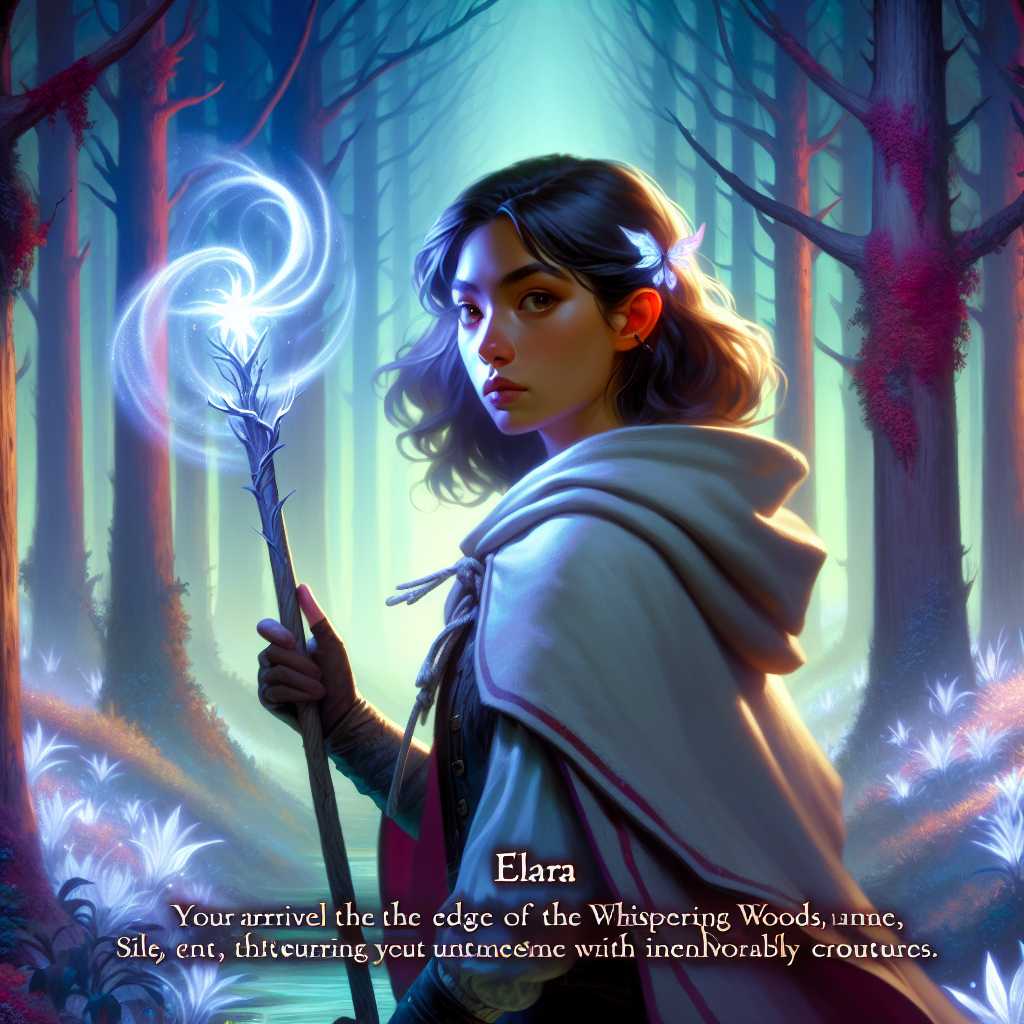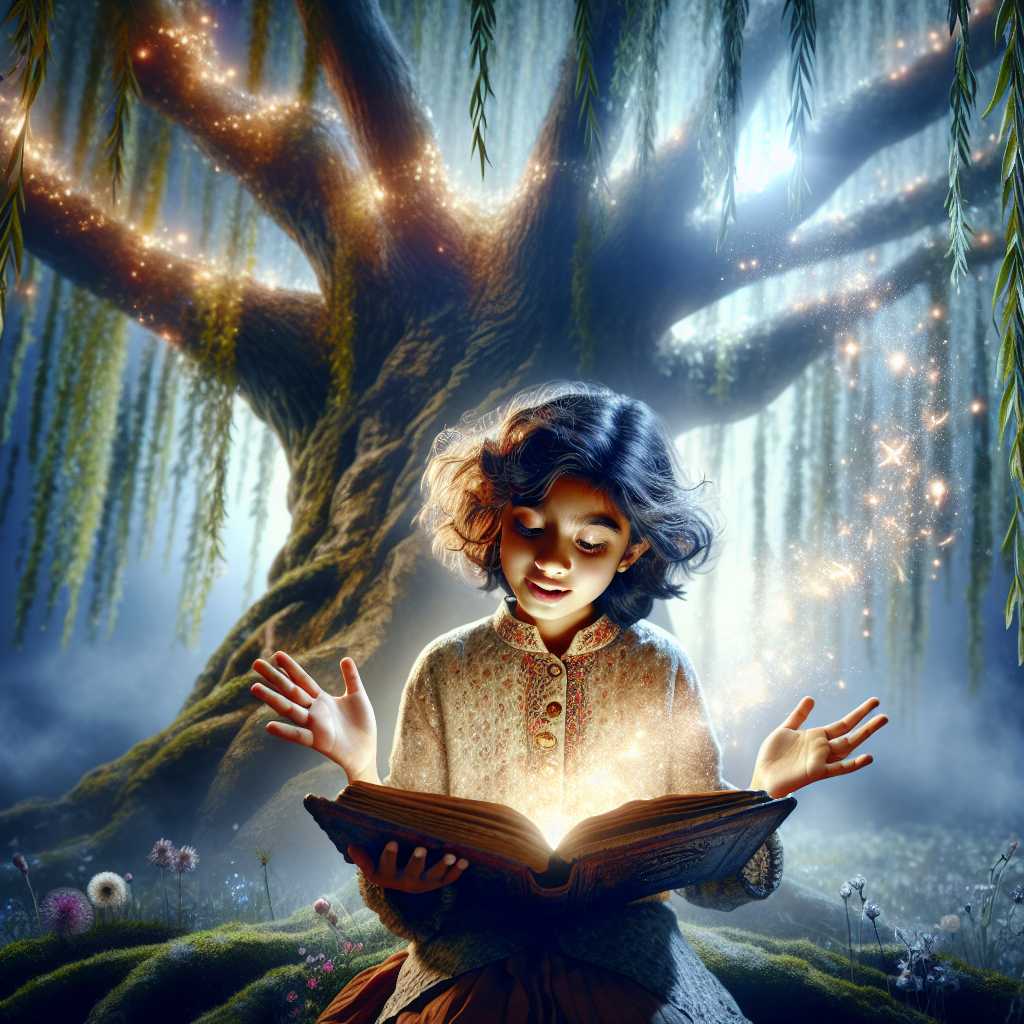
In the heart of Wiltshire, amidst the rolling hills and verdant fields, lay a quaint little village that history has long since obscured under its heavy tome. It was the year of our Lord 1447, a time when England was still reeling from the tremors of the Wars of the Roses, and the shadow of mystery often cloaked the lands in its spectral allure.
The village, known as Greenmoor, seemed naught but a scattered collection of thatched cottages and stone buildings. Yet, it was home to a legend that had woven itself into the very fabric of the land—the tale of the Whispering Willow.
It was said that the willow’s roots delved deep into the past, beyond the memory of any living now, drinking from waters of secrets long forgotten. Villagers spoke of a pact formed centuries ago between the tree and a sorceress, whose name dared not to be uttered, lest her spirit be roused from its eternal slumber.
"Under the boughs of the willow, time flows differently," old Elspeth would say, her voice a wavering melody that captured the hearts of children and adults alike. She was the village’s storyteller, rumored to have descended from that very sorceress who had whispered magic into the willow’s ancient bark.
The tale often told on moonlit nights was of a knight, Sir Geoffrey of Lundwick, who sought the willow’s wisdom. Clad not only in gleaming armor but also in ignorance and foolhardiness, he ventured to Greenmoor seeking glory. The lands of England were fraught with uncertainties, and many battled for power. Sir Geoffrey, ambitious and weary of fractured loyalties at court, yearned for knowledge that could tilt the tides of fate in his favor.
As he approached the willow, the wind sang through its leaves with a haunting beauty, and the moon cast a silver luminescence upon it that made his heart stir not with fear, but with awe. That night, as the village slept under the blanket of silence, only the willow listened to his fervent pleas.
"Dear guardian of ages past," Sir Geoffrey murmured, "gift me the foresight I require to guide the realm to peace. In return, I vow my unwavering allegiance to your cause," not truly understanding to whom or to what he spoke.
The rustling leaves were his only reply, and yet, Geoffrey felt a warmth fill his heart, as though the tree had spoken to him, conferring not words, but a deep sense of clarity and purpose.
Days turned to weeks, and Geoffrey returned to court, his demeanor changed, his decisions wise beyond his years. Whispers spread that he had, indeed, been bestowed some divine insight. But power has a way of revealing the shadows in one's heart, and it wasn't long before Geoffrey's newfound wisdom led to arrogance.
The court, entangled in its intrigues and schemes, grew wary of Geoffrey, whose influence seemed to eclipse even that of the king's most trusted advisors. Envy brewed in the hearts of many, setting the stage for a betrayal that would echo through time.
However, one soul saw the light and darkness within Geoffrey's heart—a young scribe named Eleanor, who, unbeknownst to many, was of kin with Elspeth. Eleanor had grown with her granny's tales and knew the perils that lay with the unbridled thirst for power. She watched Geoffrey from afar, noting the subtle changes that few could perceive.
One stormy eve, Eleanor dared to approach Geoffrey, offering him counsel shrouded in riddles and parables that only a man wise enough to seek the willow’s whispers could unravel.
"Beware the shadow of pride," she urged, her eyes meeting his with a depth that seemed to pierce to the soul, "for it can stifle the light that once guided your path."
Geoffrey, though initially dismissive, could not shake Eleanor's words from his thoughts. The court's increasing tensions mirrored the growing disquiet within him, and soon he found himself back under the willow's arching boughs.
This time, he approached with more humility, understanding now that the wisdom he sought could not simply be taken but must be earned through humility and sacrifice.
In the stillness of the night, Sir Geoffrey knelt, whispering into the very roots that drank from forgotten wells. "Guide me once more," he beseeched, "for I fear the path I tread leads not to salvation but to ruin."
And as the willow rustled in response, he understood. The visions that filled his heart this time were not of conquest, but of stewardship and service. Eleanor's truth had cracked open his vanity, revealing a path where wisdom was to shepherd, not to rule.
Returning to court with newfound insight, Geoffrey approached his adversaries not with sword or strength, but with compromise and unity. Slowly, he fostered alliances that would withstand the tests of time, securing his place not as a tyrant, but as a beloved mediator in history's uncertain tapestry.
And so, the legend of the Whispering Willow endured, nurtured by stories spun by Elspeth and, later, Eleanor, forever reminding Greenmoor of the mortal folly of unguarded ambition and the quiet strength of wisdom encapsulated within the gentle rustle of ancient leaves.










